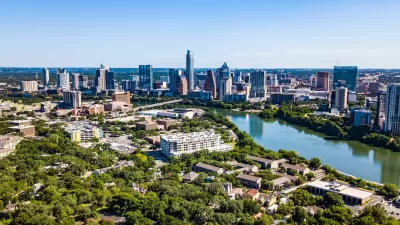The Prince George's County draft Climate Action Plan includes ambitious goals and timetables, but falls short of recommended targets for emissions reductions in the transportation sector.

In an opinion piece published in Greater Greater Washington, Bill Pugh reacts to Prince George's County's draft Climate Action Plan (CAP), calling for "a plan that helps create walkable, inclusive transit-oriented development that can drive economic prosperity and sustainable, equitable communities."
Pugh writes that while the CAP sets actionable goals and timelines and clearly illustrates the real impact of climate change, it does not go far enough to achieve the county's emissions reductions target. According to Pugh, the plan should take stronger action on transportation emissions, which make up the largest source of the county's greenhouse gas pollution.
National energy experts at Rocky Mountain Institute show that to adequately reduce climate pollution from transportation, the United States must make sure a quarter of cars on the road are clean electric vehicles by 2030 and also cut the amount Americans need to drive by 20%.In contrast, Prince George’s climate plan falls short on both accounts: it calls for only 15% of cars, SUVs and pickups in the county to be electric by 2030 and seeks a meager 3.6% reduction in how much families and workers in the County have to drive on a daily basis.
However, the plan does propose new growth management policies and encourages infill development and affordable housing production, prioritizing development in dense, transit-accessible areas.
Pugh also recommends that the plan, which will be finalized in early 2022, include advocacy for regional efforts to build more affordable, transit-oriented housing developments.
FULL STORY: Prince George’s climate plan proposes swift action, but how does it address transportation and land use?

Maui's Vacation Rental Debate Turns Ugly
Verbal attacks, misinformation campaigns and fistfights plague a high-stakes debate to convert thousands of vacation rentals into long-term housing.

Planetizen Federal Action Tracker
A weekly monitor of how Trump’s orders and actions are impacting planners and planning in America.

San Francisco Suspends Traffic Calming Amidst Record Deaths
Citing “a challenging fiscal landscape,” the city will cease the program on the heels of 42 traffic deaths, including 24 pedestrians.

Defunct Pittsburgh Power Plant to Become Residential Tower
A decommissioned steam heat plant will be redeveloped into almost 100 affordable housing units.

Trump Prompts Restructuring of Transportation Research Board in “Unprecedented Overreach”
The TRB has eliminated more than half of its committees including those focused on climate, equity, and cities.

Amtrak Rolls Out New Orleans to Alabama “Mardi Gras” Train
The new service will operate morning and evening departures between Mobile and New Orleans.
Urban Design for Planners 1: Software Tools
This six-course series explores essential urban design concepts using open source software and equips planners with the tools they need to participate fully in the urban design process.
Planning for Universal Design
Learn the tools for implementing Universal Design in planning regulations.
Heyer Gruel & Associates PA
JM Goldson LLC
Custer County Colorado
City of Camden Redevelopment Agency
City of Astoria
Transportation Research & Education Center (TREC) at Portland State University
Jefferson Parish Government
Camden Redevelopment Agency
City of Claremont





























